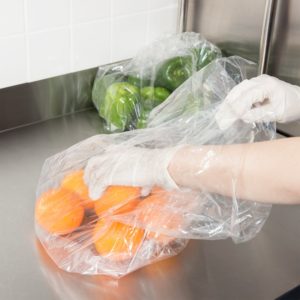Archives for April 2020
Paraquat Dichloride Training for Certified Applicators
Pesticide Storage Inventory Due May 1st: Download Rutgers Templates
Tree Fruit IPM Report for April 14, 2020
Special Announcement! : The long awaited update to the NJ Commercial Tree Fruit Production Guide is available. We have updated the pesticide tables to include new products, pesticide safety, and efficacy. We hope to have the text sections updated for 2021.
Tree Fruit Phenology:
Tree Fruit Phenology remains advanced, but development is slowing. In southern counties all peach orchards are just past full bloom to petal fall. Redhaven was at approximately full bloom on March 30, and was late bloom on 4/7. Peach bloom has been very long this year. Plums are past petal fall and Pears are in bloom. Red Delicious is pink. Cherries are in bloom. [Read more…]
Marketing Tip: Consider Pre-Bagging Produce at Farm Markets
By, Michelle Infante-Casella and Meredith Melendez, Agricultural Agents
Farm marketers can learn from recent behaviors observed in supermarkets and other food outlets as we start the produce season in New Jersey. Besides facilitating social distancing and having employees and customers wear masks and other protective gear, farm owners and workers can help ease shopping anxiety by pre-bagging items.
To date there is no scientific evidence to support the transmission of COVID-19 through food, but customer buying patterns have shown that packaged produce is selling better than loose produce. Customers are fearful of virus transmission from many different sources regardless of the science. Most people are very suspicious when touching every object around them whether it be door handles, shopping carts, checkout counters, credit card machines and also on the list – loose fruits and vegetables on shelves that may have been handled by other people. These fears are certainly understandable.
Some food stores are reporting bagged items are selling faster than loose items. The public sentiment is wrapped produce has a barrier that acts as a safety measure against contamination. Produce items in pre-packaged containers, such as bagged lettuces, bagged broccoli, bagged cucumbers, bagged peppers, packaged tomatoes and other items wrapped in plastic have increased in sales over their unpackaged counterparts. In addition, items in highest demand tend to be more shelf-stable produce like potatoes, apples, onions, unpeeled carrots, winter squashes and cabbage.
The media has been publicizing milk dumping from tanker trucks, in-season produce fields being plowed, and issues with food distribution across the country due to issues from COVID-19. Consumers are questioning many issues right now. Is the U.S. food supply safe? Will there be enough food to go around? Will the food stores be closing? Is it safe to buy fresh produce? Should I worry when I see empty store shelves?
To ensure a domestic food supply in the future, it is more important than ever for customers to buy local and US farm products. This is a message the entire agriculture industry can share with the public.
Some questions about food and COVID-19 can be answered by reading the U.S. Food & Drug Administration’s website https://www.fda.gov/food. This is also a good site to send your customers to help answer their questions. Resources specific for the agricultural community are listed on the Rutgers On-Farm Food Safety COVID-19 website.
In summary, farm market proprietors may want to keep produce displays well stocked with plenty of bagged and packaged produce items. This will also help facilitate having customers in the market for shorter periods. Customers can just pick up bags and go rather than pick through a pile and taking extra time to bag their own items. In addition, pricing bags ahead of time, that don’t need to be weighed, can also quicken check out times. Shoppers are in a hurry to get in and out of stores to ease fears of potential virus transmission. Making it as easy as possible to help facilitate shopping and check out may go a long way to lessen customer anxiety in current times. Keep engaged with customers for suggestions on what they may need from your market.
Farmers and farm markets will be playing a major role in food distribution and food security in the near future and beyond. Thank you to all farmers, farm workers, and other essential workers in this time of crisis.
TONIGHT – Spanish-language Training for Farmworkers and Farmers on Coronavirus
The Cornell Farmworker Program and the Finger Lakes Community Health Clinic will be hosting a webinar and Q and A, in Spanish, for farm workers and farmers. Dr. Canario, Medical Director of Finger Lakes Community Health will discuss the coronavirus, what it is, how to protect oneself, and what one should do now. He will also respond to questions submitted in advance. Mary Jo Dudley, Cornell Farmworker Program will moderate the session.
Farm employers are encouraged to share this with Spanish-speaking employees, and consider hosting a farm meeting since this will be broadcasted via Zoom.
Time: Monday, April 13, 2020 at 6:30 PM.
To register and submit questions, please visit: https://docs.google.com/forms/d/e/1FAIpQLScsocEZCwGgIiGi3V2X-d0Ws_Zq78k5XSeSqGVbIReE13Jw9w/viewform?vc=0&c=0&w=1
El Programa de Apoyo a los Trabajadores Agrícolas de la Universidad de Cornell y
Finger Lakes Community Health (la clínica) invita cordialmente a los trabajadores agrícolas a una llamada gratuita con el Doctor José Canario.
“Los trabajadores agrícolas y el coronavirus: Lo que debe saber y lo que puede hacer ahora”
Doctor José Canario, Director de Medicina del Finger Lakes Community Health explicara el coronavirus y responderá a sus preguntas.
Por favor invite a sus compañeros de trabajo y familiares. La llamada será moderada por Mary Jo Dudley, Programa de Apoyo a los Trabajadores Agrícolas.
Lunes, Abril 13, 2020
6:30 PM
Clic aquí para registrarse y enviar sus preguntas
April 10: Governor Murphy’s EO 122 – Impacts to the Landscaping Industry
NJ Governor Murphy’s Executive Order 122 pertaining to non-essential construction and landscaping as of Friday, April 10, 2020:
• Maintenance including cutting grass, weed wacking and leaf blowing (including cleanups) Permitted
• Install patios, walkways, pools, etc – NOT PERMITTED, unless project has begun before Friday 4/10 at 8:00 pm or there is an emergency fix to the front walkway
• Install plantings, including flowers and shrubs – Permitted
• Install irrigation systems – NOT PERMITTED, unless project has begun before Friday 4/10 at 8:00 pm. System startups and emergency repairs are permitted.
• Perform pruning and trimming – Permitted
• Provide weed and pest control services – Permitted
• OK Put down mulch or top dress – Permitted
• Install sod or seed lawns – Permitted (however, note that irrigation systems cannot be installed, so this would be at the discretion of the company if they can properly irrigate).
In addition, there is a limit of 5 crew members on site at all times. Masks (or some type of facial covering) and gloves must be worn and p rovided by company to employees. Start times and lunch times should be staggered to avoid employees having close contact. Previous social distancing rules still apply. Employees/customers must keep six feet apart at all times except when workers must do a task together.
rovided by company to employees. Start times and lunch times should be staggered to avoid employees having close contact. Previous social distancing rules still apply. Employees/customers must keep six feet apart at all times except when workers must do a task together.
